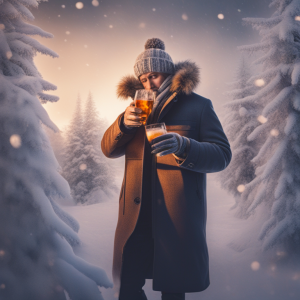Understand the Dangers of Alcohol Consumption in Extremely Cold Weather
As we endure the harsh realities of winter, especially in extremely cold climates, the instinctive urge to seek warmth often leads many individuals to turn to alcohol for comfort. However, it’s crucial to grasp the significant risks associated with this choice. This article aims to illuminate the dangers linked to alcohol consumption in frigid environments, highlighting why relying on alcohol is not only perilous but also ineffective for maintaining body heat. By enhancing your understanding of these risks, you can make informed choices that prioritize your safety and well-being during the treacherous winter conditions.
Before exploring the associated dangers, it’s vital to address the widespread misconception that alcohol acts as a warming agent. When consumed, alcohol leads to the dilation of blood vessels near the skin’s surface, which can create an initial, deceptive sensation of warmth. While this fleeting feeling may seem comforting, it does not meet the essential requirement for sustaining a stable internal body temperature. In fact, the physiological effects of alcohol can be detrimental, compromising your ability to withstand cold weather and significantly heightening the risk of experiencing severe conditions such as hypothermia and other critical health complications.
 Among the most alarming dangers associated with consuming alcohol in cold environments is the heightened risk of dehydration. Alcohol acts as a known diuretic, which stimulates increased urine production, resulting in significant fluid loss. Additionally, the cold air typical of winter conditions is inherently drier, causing our bodies to lose moisture at an accelerated rate in these climates. When these factors converge, the outcome can be dangerously low hydration levels, which are critical for maintaining overall health and survival. Dehydration not only negatively impacts physical performance but also impairs cognitive functions, making it difficult to think clearly and make rational decisions in crucial situations.
Among the most alarming dangers associated with consuming alcohol in cold environments is the heightened risk of dehydration. Alcohol acts as a known diuretic, which stimulates increased urine production, resulting in significant fluid loss. Additionally, the cold air typical of winter conditions is inherently drier, causing our bodies to lose moisture at an accelerated rate in these climates. When these factors converge, the outcome can be dangerously low hydration levels, which are critical for maintaining overall health and survival. Dehydration not only negatively impacts physical performance but also impairs cognitive functions, making it difficult to think clearly and make rational decisions in crucial situations.
Recognize How Alcohol Affects Decision-Making and Awareness in Cold Weather
Another significant consequence of alcohol consumption is its capacity to impair cognitive function and decision-making abilities. In survival scenarios, making sound, rational decisions is essential for ensuring safety. Alcohol can obscure judgment, making it increasingly challenging to respond appropriately to hazards. This reduced ability to reason can lead to accidents and poor choices, which can be particularly disastrous when confronted with extreme cold. Remaining vigilant and aware of one’s surroundings is vital; however, alcohol undermines this necessity, resulting in an increased likelihood of errors that could jeopardize personal safety.
Furthermore, alcohol can severely disrupt the body’s natural ability to regulate its temperature. When consumed, alcohol causes blood vessels in the skin to expand, leading to greater heat loss. Initially, this may produce a temporary sensation of warmth, but over time, it accelerates the loss of core body heat, which is vital for survival. This creates a hazardous cycle where the brief warmth leads to a swift decline in core temperature, thereby amplifying the risk of life-threatening conditions such as hypothermia. It is critical to recognize that while alcohol may seem to provide a quick solution for the cold, it ultimately increases your vulnerability to extreme temperatures.
Understand the Link Between Hypothermia Risk and Alcohol Consumption
When considering the risk of hypothermia, it is imperative to understand how alcohol consumption can obscure the early warning signs of this dangerous condition. Hypothermia occurs when the body’s core temperature falls below the normal range, typically below 95 degrees Fahrenheit (35 degrees Celsius). Symptoms can manifest as shivering, confusion, fatigue, and reduced coordination. However, alcohol works to suppress our body’s natural responses, making it increasingly difficult to recognize these vital indicators. By the time the signs of hypothermia are apparent, it may already be too late to avert severe injury or even life-threatening consequences.
In winter survival scenarios, there are numerous safer and more effective alternatives to alcohol for maintaining body warmth. Here are some strategies that can significantly enhance your ability to stay warm and safe:
1. Dress in Layers to Maximize Warmth: Wearing multiple layers of clothing is essential for effectively trapping warm air. Start with thermal base layers, add insulating mid-layers, and finish with a windproof and waterproof outer layer to create a protective barrier against the cold.
2. Keep Your Clothing and Footwear Dry at All Times: Moisture can lead to rapid heat loss, so ensuring that your clothing and footwear remain dry is crucial. Opting for waterproof materials and changing into dry garments whenever necessary will significantly aid in maintaining warmth.
3. Insulate Yourself from the Cold Ground: Utilizing sleeping mats or insulation pads can greatly reduce heat loss, particularly during sleep. This step is vital for conserving body heat during prolonged exposure to cold environments.
4. Choose Warm, Non-Alcoholic Beverages: Instead of turning to alcohol, consider hot beverages like tea, coffee, or hot chocolate. These drinks provide warmth without the adverse effects associated with alcohol consumption.
5. Seek or Construct Shelter to Protect Yourself: Actively looking for or building a shelter can significantly minimize exposure to harsh winds and freezing temperatures. A well-constructed shelter plays a crucial role in retaining body heat, greatly improving your chances of staying warm.
6. Fuel Your Body with Nutrient-Rich, High-Calorie Foods: Consuming nutrient-dense foods that are high in calories can provide your body with the necessary energy to generate heat. Foods such as nuts and fatty fish are excellent sources of healthy fats that can be particularly beneficial.
Gaining a comprehensive understanding of the risks associated with alcohol consumption in freezing temperatures is essential for anyone involved in winter survival situations. Despite the brief sensation of warmth, alcohol can lead to dehydration, impaired decision-making, hindered temperature regulation, and mask the symptoms of hypothermia. By avoiding alcohol and implementing safe, effective strategies, we can enhance our chances of surviving and thriving in harsh winter environments. Stay alert, prepare adequately, and prioritize your safety above all else.
The post Hazards of Alcohol Consumption in Extreme Cold Conditions appeared first on Survival Bite.
The Article Alcohol Consumption Hazards in Extreme Cold Conditions Was Found On https://limitsofstrategy.com


I really appreciate you diving into this topic; it’s one that often gets overlooked during winter. I can definitely relate to that instinctive desire to seek out warmth when the temperatures drop. I remember last winter, I spent a weekend in a cabin with friends, and after a long day of snowboarding, we all gathered around the fireplace with some hot toddies. We felt cozy, laughing together, but it was only later that I learned more about the dangers of mixing alcohol with extreme cold.
I really appreciate the perspective you’re sharing in this post; it’s something that doesn’t usually get enough attention. The allure of using alcohol to combat the chill of winter is something many can relate to, especially after a long day out in the frigid air. But I’ve learned over the years that this approach can be quite misleading.
I totally see where you’re coming from. The way winter invites us to cozy up with a drink can be really tempting. There’s something comforting about a warm cocktail or a glass of whiskey when you’re coming in from the cold. It’s easy to feel like a warm drink is the perfect reward after braving the chilly air.
I completely relate to that feeling of coming in from the cold and wanting to settle in with a warm drink. There’s something so nostalgic about it, too. It reminds me of winter evenings spent by the fire, maybe with a good book or some music playing in the background. I find that a well-mixed warm cocktail can really elevate the experience, especially when you can play with flavors that tie into the season. A spiced apple cider with a splash of bourbon, for instance; it strikes that perfect balance of cozy and festive.
This is such an important reminder! I’ve definitely seen groups of friends cozying up with drinks during winter gatherings, thinking it’ll keep them warm. It’s easy to overlook the science behind it, though. I remember a hiking trip in winter where a friend had a couple of shots to “stay warm,” but we ended up feeling colder and more sluggish. It’s fascinating how misconceptions about alcohol can affect our decision-making, especially when it comes to our health and safety.